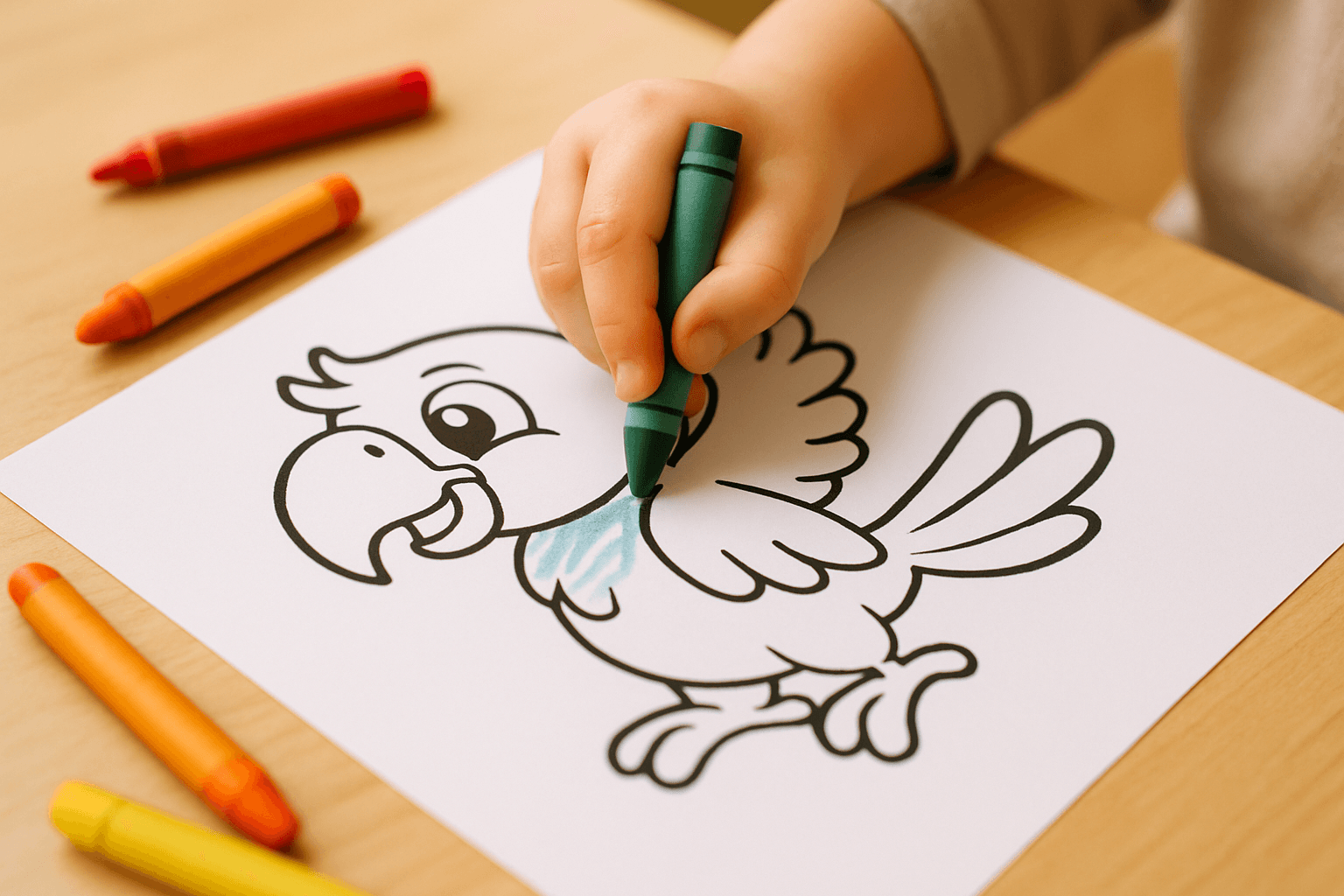
Free Animal Coloring Pages for Kids
Parrot Coloring Sheets: PDF Downloadable Bundle
Downloadable Printable PDF Bundle
Free Parrot Coloring Pages For Kids
Welcome to a world of color, chatter, and cheerful feathers! Parrots are some of the most vibrant and talkative birds on our planet, and they love making friends with people just like you. Our Parrot Coloring Pages bundle invites you to meet these playful birds and bring them to life with your favorite colors.
Whether you’re a parent, teacher, or a curious little artist, these pages are designed to spark creativity and learning. With friendly parrots in all sorts of silly and adventurous scenes, every sheet is a chance to practice coloring skills, discover new facts, and let your imagination fly. Let’s dive into the jungle and have some feathery fun together!
What’s In Your ‘Parrot’ Coloring In Pack
Inside this parrot coloring bundle, you’ll find a delightful collection of printable coloring sheets featuring parrots in all sorts of playful adventures. Each page is designed to capture your child’s imagination, encourage creativity, and introduce fun learning moments. From jungle scenes to pirate tales, these coloring sheets offer hours of cheerful, educational fun for preschoolers, families, and classrooms.
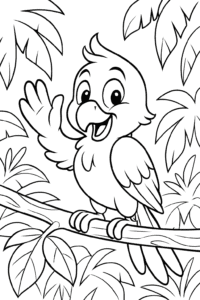
Meet Polly the parrot, waving her wing as she greets you from her favorite jungle perch!
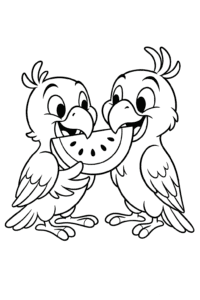
These two feathered friends are having a fruity picnic with juicy mangoes and bananas.
What fruits do parrots like to eat? Try coloring the fruit and then talk about your favorite healthy snacks!
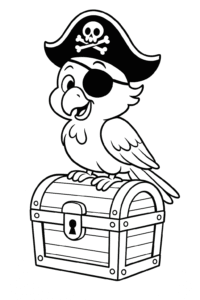
Ahoy! This pirate parrot has found treasure and is ready for a swashbuckling adventure.
Imagine your own pirate story! What treasures would your parrot find? Draw your own treasure next to the chest.
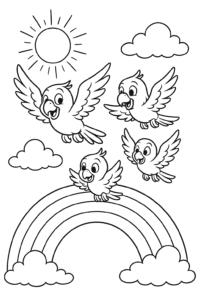
The parrot family soars together, gliding over a bright, beautiful rainbow.
Count how many parrots are flying in the sky.
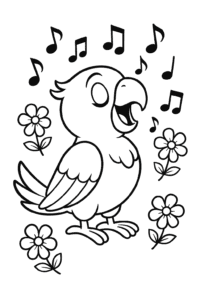
This joyful parrot loves to sing sweet songs while flowers bloom all around.
Famous Parrots
In the beloved Disney movie ‘Aladdin,’ the comical parrot Iago is known for his witty remarks and his partnership with the villainous Jafar, making him a memorable and mischievous feathered character.
The classic children’s book ‘The Parrot Who Owns Me’ by Joanna Burger tells the true story of a clever parrot named Tiko who brings joy and surprises into his owner’s life every day.
In ‘Pirates of the Caribbean,’ Captain Barbossa’s loyal parrot sidekick often sits on his shoulder, squawking pirate phrases and adding a touch of humor and tradition to the adventurous crew.
The animated film ‘Rio’ stars Blu, a rare blue Spix’s Macaw, who embarks on a colorful journey to discover his roots and meet new friends in the vibrant city of Rio de Janeiro.
In the classic ‘Peter Pan’ tales, Captain Hook’s pirate ship is never complete without a brightly colored parrot, reminding everyone of the high-seas adventures and the magic of Neverland.
Fun Facts About Parrots
Parrots are famous for their bright feathers, but did you know there are over 400 different species of parrots around the world? They come in all sorts of colors, including green, red, yellow, and blue! Some parrots, like the macaw, can even have rainbow-colored plumage. Each species has its own unique look and personality, making parrots a truly special group of birds.
One of the most amazing things about parrots is their ability to mimic sounds and even talk! Parrots have strong, flexible tongues and clever brains that help them copy words, whistles, and even laughter. Some parrots can learn dozens of words or phrases and love to chat with their human friends.
Parrots live in many different places, from steamy rainforests to dry savannas. Most wild parrots spend their days flying through the treetops, searching for tasty foods like seeds, nuts, fruits, and flowers. Some parrots, like the kea from New Zealand, are even known for being mischievous and playful explorers.
Parrots are very social birds and love to live in flocks. They often preen each other’s feathers, play together, and even share food. This social behavior helps parrots stay safe from predators and build strong friendships within their group.
Some parrots can live a very long time—up to 50 years or more! Larger parrots like macaws and cockatoos can be lifelong companions for families. Taking care of a parrot means providing lots of love, attention, and fun things to do every day.
Free ‘Parrot’ Coloring Page Bundle PDF Download
Download the 5 free ‘Parrot’ Coloring Pages.
Please complete the captcha to download the file.
Download Parrot Coloring Pages Bundle (pdf)Phonics Focus
The word ‘parrot’ starts with the letter P, which makes a soft popping sound: /p/. Say it with us: ‘Puh-puh-parrot.’ The next part, ‘arrot,’ sounds like ‘air-rot.’ When you put it all together, it’s ‘PAR-rot.’ The accent is on the first syllable, so you say ‘PAR’ a little louder than ‘rot.’ Parrots are great for practicing the ‘P’ sound, and you can try saying words like ‘purple,’ ‘party,’ and ‘parade’ to help remember. Listen carefully as you say ‘parrot’—your lips come together for the ‘P,’ then your mouth opens wide for ‘arrot.’ Practicing the word ‘parrot’ is a fun way to play with sounds and learn new letters. Try saying it in a silly parrot voice for extra fun!
The Benefits of Coloring for Kids
Coloring isn’t just a fun activity—it helps children build important skills! When kids color parrots, they practice holding crayons, controlling their hand movements, and learning about colors and shapes. Coloring also encourages patience, focus, and creativity. Plus, it’s a wonderful way for children and adults to spend time together, sharing stories and smiles as they bring each parrot to life.
Teaches colour recognition – Matching colours with objects helps learning colour names and combinations.
Introduces early math concepts – Counting shapes and repeated patterns develops foundational skills.
Enhances learning readiness – It primes readiness for writing, using drawing and pattern recognition.
Improves mood through colour therapy – Colour has subconscious emotional influence (as studied by Jung).
Reduces stress and anxiety – Colouring induces a calm, meditative state like mindfulness.
Fosters social interaction – Group colouring builds sharing, cooperation, and discussion.
Creative Ways to Use Parrot Coloring Pages for Learning
1. Storytelling Adventures
Coloring pages can be the start of a magical story! After children finish coloring their parrot, ask them to make up a story about what their parrot is doing. Is the parrot flying to a secret island or making friends in the jungle? You can write down their story or have them share it aloud with the group. This builds imagination, language skills, and confidence in speaking.
2. Art Gallery Displays
Show off your child’s creativity by hanging completed parrot pages on a wall or in a classroom display. Make a ‘Parrot Parade’ wall, where every colored bird gets a special spot. Encourage children to describe their parrot’s colors and patterns to others. This helps with color recognition, vocabulary building, and gives children a sense of pride in their work.
3. Jungle Scavenger Hunts
Turn coloring time into an interactive scavenger hunt! Hide small parrot coloring pages or cut-outs around the room or playground. Give clues using simple directions or descriptive words like ‘under the green chair’ or ‘next to the blue basket.’ Children practice listening, following instructions, and learning position words like above, below, or beside. This activity also helps with gross motor skills as children move around to find the hidden birds.
4. Roleplay and Phonics Practice
After coloring, invite children to pretend they are parrots. Practice saying ‘parrot’ together, clapping once for each syllable: ‘PAR-rot.’ Try making up silly parrot voices and repeating simple phrases like ‘pretty parrot’ or ‘polly wants a cracker.’ This builds phonics awareness, helps with letter recognition (especially the letter ‘P’), and makes learning sounds exciting.
5. Color and Count Math Fun
Use the parrot pages to practice counting and simple math. Ask questions like, ‘How many parrots did you color red?’ or ‘Can you find all the parrots with yellow beaks?’ You can even add number stickers or write numbers next to each bird. This builds early math skills and encourages attention to detail.
6. Vocabulary Building
As children color, introduce new words related to parrots: beak, feather, perch, wings, and rainforest. Use the coloring pages as visual aids while teaching these words. For a memory game, show the colored pages, say a word, and ask children to point to where they see it.
7. Take-Home Learning Packs
Send home a set of parrot coloring pages with a mini fact sheet. Encourage families to read about parrots, color together, and even visit the library to find books about birds. This strengthens the school-home connection and extends learning beyond the classroom.
By using parrot coloring pages in these creative ways, parents and teachers can make learning joyful and memorable. These activities support fine motor skills, social interaction, phonics development, early math, and a love of language and storytelling. Best of all, they bring families and classrooms together in a world of color and imagination!
Download the 5 Free ‘Parrot’ Coloring Page Bundle.
Please complete the captcha to download the file.
Download Parrot Coloring Pages Bundle (pdf)More Coloring Bundles
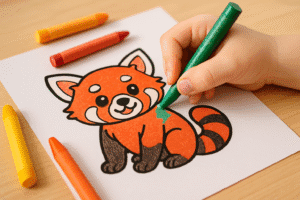
Red Panda Coloring
Explore our Red Panda for fun and creativity. Perfect for young artists and red panda fans alike!
View Bundle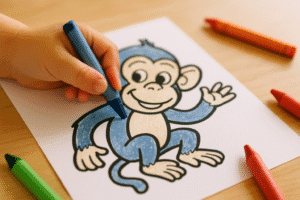
Explore the Jungle with Chimpanzee Coloring for Kids
Unleash creativity with Chimpanzee . Fun and educational sheets for young artists to explore jungle life!
View Bundle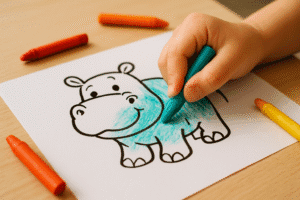
Hippo Coloring : Fun & Learning for Kids
Explore our Hippo that spark creativity and offer fun learning experiences for children and families.
View Bundle